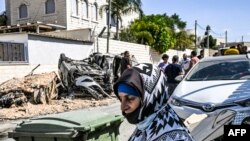Israel’s ambassador to South Korea believes North Korean weapons are being used by Palestinian militant group Hamas to attack Israel, even as Pyongyang has denied the accusations that have surfaced online as groundless.
Akiva Tor, the Israeli ambassador serving in South Korea since 2020, told VOA’s Korean Service on the phone from Seoul on Saturday that Hamas militants are using weapons manufactured by North Korea.
“In Gaza, as it is the one which attacks us, they use North Korean weapons,” said Tor. “It could be that these North Korean weapons have been in Iran for quite a long time.”
“We will destroy these weapons in Gaza,” he added.
Since Hamas attacked Israel on October 7, photos of F-7 rocket-propelled grenades with a claim they were made by North Korea have been surfacing on X, formerly known as Twitter.
A self-proclaimed weapons researcher, who uses the name War Noir, posted photos of rockets and machine guns with the caption that Israel Defense Forces allegedly captured the North Korean-made weapons belonging to the Al-Qassam Brigades near Gaza.
Bruce Bechtol, a former intelligence officer at the U.S. Defense Intelligence Agency who is now a political science professor at Angelo University in Texas, told VOA Korean via email that the F-7s in the photos that are “identified [as] looking like North Korean in origin, look that way to me as well.”
“It appears likely that considerable number of the weapons that Hamas has [been using came] from the North Koreans,” said Bechtol.
Bechtol continued that more North Korean weapons are likely to be found in Gaza after the Israeli Defense Forces begin a ground offensive in the territory.
North Korea denied its weapons were used by Hamas to attack Israel through a statementissued on its state-run KCNA on Friday.
The U.S. is spreading “groundless and false rumors” that North Korean weapons were used in the attack on Israel as a way “to shift the blame for the Middle East crisis caused by its wrong hegemonic policy onto a third country,” said the KCNA.
Analysts said it is not surprising that Hamas appears to be using North Korean arms as Pyongyang has a long history of supplying arms to Hamas, the Lebanon-based armed group Hezbollah and Iran, which supports both groups.
James Jeffrey, who from 2018 until November 2020 served as U.S. special representative for Syria engagement and special envoy to the Global Coalition to Defeat ISIS, is currently chair of the Wilson Center’s Middle East Program. He told VOA Korean during an Oct. 10 telephone interview, “North Korea has long provided weapons and technical knowledge to radical forces in the Middle East.”
He continued, “I wouldn’t be surprised because North Korea is engaged in illicit arms sales and deliveries, both to make money and to destabilize the international order in a big way. Therefore, every time we have a crisis or a new conflict, there’re North Korean fingerprints.”
Fred Fleitz, who spent 19 years with the CIA and served as acting national security advisor during the Trump administration, said, “It certainly appears that either through a direct deal in which Hamas paid the North Koreans or through the IRGC, the Iranian Republic Guard Corps, they smuggled those weapons in or through Hezbollah.”
Fleitz, who is now the vice chair of the Center for American Security, continued, “But the latter seems more convincing. Iran is closer to both North Korea and Palestine and likely has many more routes.”
Multiple U.N. Security Council resolutions ban North Korea from exporting weapons.
Matthew Miller, a spokesperson for the U.S. State Department, at a press briefing on October 10 said the U.S. will “look to counter” actions by any country that is providing either financial or military support to Hamas.
U.S. National Security Council spokesperson John Kirby said on Thursday that he could not confirm reports of North Korean weapons being used by Hamas.
The possibility of arms dealings between North Korea and Hamas first surfaced in 2009.
In December of that year, a North Korean plane carrying about 35 tons of weapons including rockets and rocket-propelled grenades were seized at a Bangkok airport while the aircraft landed there for a refueling stop. The next month, the Thai government submitted a report to the U.N. Security Council saying the weapons were headed to Iran.
White House’s Deputy National Security Advisor for Strategic Communications Ben Rhodes said in November 2012 that Thailand’s interdicted shipment from North Korea in 2009 were “bound for Hamas.”
In 2013, a UNSC report included photographs of North Korea weapons in the cargo plane.
At the time of the weapons shipments, Israel was fighting a proxy war with Iran for supporting Hamas and Hezbollah, according to then-Israeli Deputy Prime Minister Moshe Yaalon.
Tor told VOA’s Korean Service that “there’s no question” Iran is supporting Hamas politically, financially and strategically. But he said he is “not able to say” what exact role Iran has played in this conflict.
Tor also dismissed speculation that Tehran used $6 billion of its funds unfrozen from South Korean banks to support Hamas in this conflict.
“We don’t have any evidence that the release of the funds, which were held in [South] Korean banks, have reached Hamas in any way,” he said.
Tor continued, “Israel’s view, in general, is that sanctions against Iran should not be eased up, and that funds that go to Iran, even when they’re directed to humanitarian purposes, [could be used] for improper purposes.”
U.S. Secretary of State Antony Blinken said last week that Iran has not been able to tap any of the funds that were released from South Korean banks and that those funds “could only be used for humanitarian purposes.”
The transfer of funds was arranged as part of a prisoner swap between the U.S. and Iran. Iran released five U.S. citizens held hostage in exchange for the release of the funds and transfer of five Iranians held in the U.S.
Jiha Ham and Sangjin Cho of the Korean Service contributed to this report.




